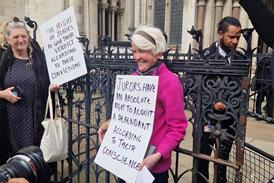The IVF clinic had implanted an embryo containing the appellant’s gametes into his former partner (R), from whom the appellant had, by then, separated, without the appellant’s consent (his signature having been forged). R had later given birth to a child. The Court of Appeal, Civil Division, ruled, among other things, that the legal policy which prevented recoverability of the cost of the upbringing of a healthy child tortious claims applied to the appellant’s claim for breach of contract.
The appellant’s appeal in respect of his claim for breach of contract against the respondent IVF clinic was dismissed.
[2018] All ER (D) 81 (Dec)
*ARB v IVF Hammersmith
[2018] EWCA Civ 2803
Court of Appeal, Civil Division
King, David Richards and Nicola Davies LJJ
17 December 2018
Contract – Damages for breach – Upbringing of child
Background
In November 2010, the respondent IVF clinic (the clinic) thawed and implanted an embryo containing the appellant’s (ARB’s) gametes into R, from whom ARB had, by that date, separated. Clause 1(a) of the contract which the parties had entered into for the provision of fertility services (the contract) provided that R and ARB had to both give written consent before any embryos were thawed and replaced. The clinic had failed to obtain ARB’s written or informed consent to the procedure and had proceeded on the basis of a signature on the relevant form, which a judge had later found to have been forged by R.
The embryo was one of several created from ARB’s and R’s gametes during previous IVF treatment at the clinic. That earlier treatment had resulted in the birth of their son. As a result of the clinic’s alleged breach of contract in thawing and implanting the embryo without consent, R gave birth to a daughter, E, who was now the sibling of ARB’s son.
ARB sought damages for the pecuniary losses relating to E’s upbringing (past and future), allegedly incurred as a result of the clinic’s breach of contract.
ARB succeeded on all aspects of his primary case against the clinic for breach of contract. However, the judge held that he could not recover damages for the cost of E’s upbringing for reasons of policy. In particular, the judge held that the legal policy enunciated by the House of Lords in McFarlane v Tayside Health Board[1999] 4 All ER 961 and Rees v Darlington Memorial Hospital NHS Trust[2003] 4 All ER 987, which was applicable to tortious claims concerning wrongful conception or birth, and which prevented recovery of loss arising from the birth of a healthy child, applied to contractual claims and, as such, thwarted ARB’s claim.
ARB appealed.
Appeal dismissed.
Issues and decisions
(1) Whether the judge had wrongly found the claim to be barred on grounds of legal policy (ground 1).
ARB submitted that the legal policy developed in cases of tort resulting from wrongful conception or birth, which prevented recovery of loss arising from the birth of a healthy child, did not apply in cases of contract.
Applying settled law to the facts, ground 1 failed. ARB had accepted that legal policy had a part to play in contract, as well as tort. The legal policy which prevented recoverability of the cost of the upbringing of a healthy child in the tortious claims in Rees and McFarlane applied to ARB’s claim for breach of contract (see [39] of the judgment).
There was nothing in the contract which modified the approach of the common law which had to include legal policy. It followed that there was no legal basis on which to differ in terms of the recovery of the claimed loss as between contract and tort (see [36] of the judgment).
McFarlane v Tayside Health Board [1999] 4 All ER 961 applied; Rees v Darlington Memorial Hospital NHS Trust [2003] All ER (D) 271 (Oct) applied; Hadley v Baxendale [1843-60] All ER Rep 461 considered.
(2) Whether, as the clinic submitted, ARB’s claim should be dismissed on the additional ground that cl 1(a) of the contract (cl 1(a)), properly construed, was not a strict obligation, but one of reasonable care (the additional ground).
The obligation of the clinic, identified in cl 1(a), was strict. Accordingly, the additional ground would not be upheld (see [54] of the judgment).
The natural meaning of cl 1(a) was that no embryo would be thawed or replaced without the written consent of both ARB and R. That clause had two consequences: first, that the clinic had been under a duty not to thaw or replace an embryo without the written consent of both ARB and R; and second, that neither of them would be entitled to object if the clinic refused to thaw or implant an embryo without the written consent of both of them (see [45] of the judgment).
Adopting the approach identified in authority, the wording of cl 1(a) imposed an absolute restriction on the thawing or implanting of an embryo without consent. There was nothing in its wording which limited the clinic’s obligation to a duty of reasonable care. There was no ambiguity in the clause (see [49] of the judgment).
The duty not to act without the written consent of ARB and R was a straightforward process which had required the physical obtaining of the written document. That process had not been dependent on medical or scientific skill. It had not required account to be taken of medical or scientific uncertainty which, in the context of a process which required that, was a significant factor in the rationale underpinning the more limited duty to take reasonable care (see [50] of the judgment).
Wood v Capita Insurance Services Ltd [2017] All ER (D) 182 (Mar) applied; Platform Funding Ltd v Bank of Scotland plc [2008] All ER (D) 422 (Jul) adopted.
(3) Whether, as ARB submitted, by reason of the judge’s findings that the clinic’s process for ensuring consent was illogical, the judge had erred in holding that the clinic was not in breach of any duty to take reasonable care to obtain ARB’s written and informed consent (the second ground of appeal).
ARB accepted that, in the event that the appeal failed on ground 1, ground 2 did not strictly require determination. The court had chosen to address ground 2 because of the fundamental importance of the issue of obtaining consent as a part of the clinic’s process.
Consent was a cornerstone of the Human Fertilisation and Embryology Act 1990 Act (HFEA 1990). A procedure which permitted delegation for the obtaining of consent to a person who was not employed by the clinic and, critically, could have her/his own reasons for providing consent which was not true consent was not only illogical, it made a mockery of a process, the purpose of which was to obtain valid written consent. The identified practice of the clinic was neither reasonable nor responsible (see [59] of the judgment).
It followed that the second ground of appeal had been made out. However, applying settled law to the facts, the appeal would be dismissed (see [59], [62]-[64] of the judgment).
Bolitho v City and Hackney Health Authority [1997] 4 All ER 771 considered; Montgomery v Lanarkshire Health Board [2015] 2 All ER 1031 considered.
Decision of the Queen’s Bench Division [2017] All ER (D) 30 (Oct) Affirmed.
David Halpern QC, Michael Mylonas QC and Susanna Rickard (instructed by Hughes Paddison) for ARB.
Jeremy Hyam QC and Suzanne Lambert (instructed by Hempsons) for the clinic.
Michael Powers QC and Mark McDonald (instructed by Axiom Stone Solicitors) for the third party.
Carla Dougan-Bacchus - Barrister.


















![David Lester (senior partner at Blythe Liggins), Darryl Barnes, Jagdeep Sandher (head of dispute resolution at Blythe Liggins)[4]](https://d1d8vslyhr7rdg.cloudfront.net/Pictures/274x183/4/2/8/116428_davidlesterseniorpartneratblytheligginsdarrylbarnesjagdeepsandherheadofdisputeresolutionatblytheliggins4_981603_crop.jpg)








1 Reader's comment